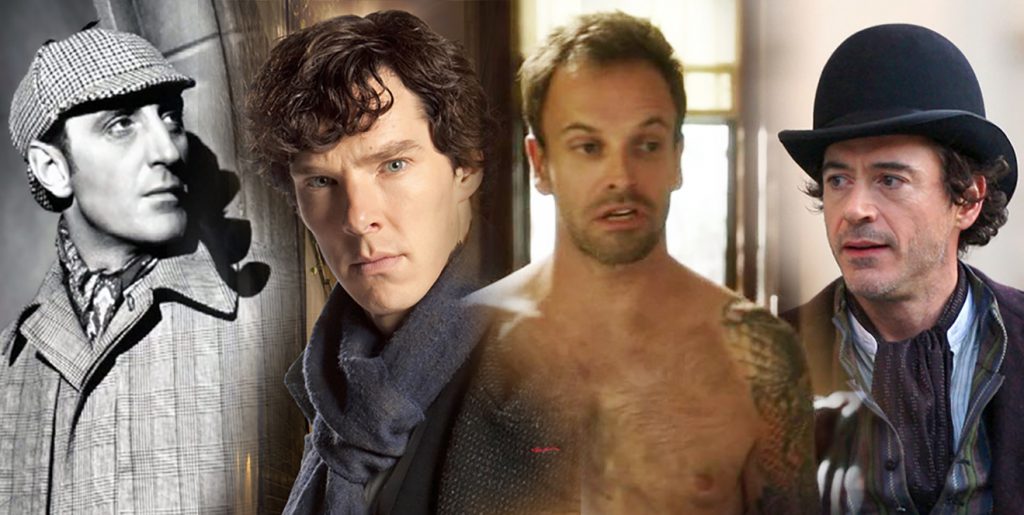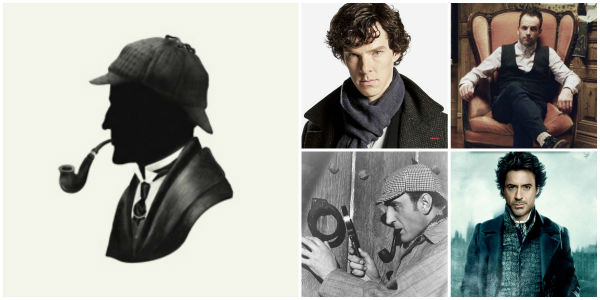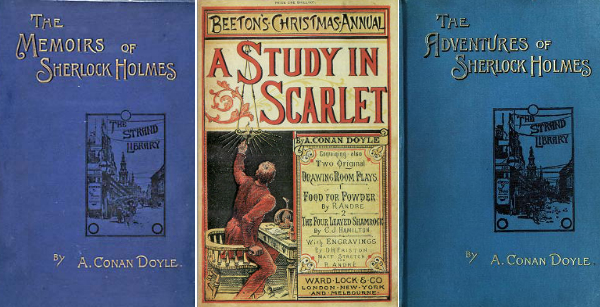Sherlock Holmes and The Case of Too Many Adaptations
Has there ever been a literary character adapted to film and television as much as Sherlock Holmes? From the Basil Rathbone films of the '30s and '40s to Sherlock, Elementary, and Danny Boyle’s films starring Robert Downy Jr. and Jude Law, there have been many variations on Holmes and Watson. Heck, we even have a Sherlock Holmes Handbook for would-be sleuths. But what might the characters themselves think about these adaptations?
HOLMES: Ah, Watson. You’ve returned. How was the motion picture show?
WATSON: Incredible! You should have gone. At least you would have found the technology fascinating.
HOLMES: I’ve read about it.
WATSON: That’s not the same.
HOLMES: It is to me.
WATSON: You wouldn’t say that if you’d gone. Nothing more than light and shading on a screen, and yet, I was transported! It was like I was there, in the picture.
HOLMES: Fantabulist nonsense.
WATSON: It got me thinking…you remember that theatrical agent who came by a fortnight past?
HOLMES: I remember telling him in uncertain terms that a theatrical representation of my life was out of the question.
WATSON: Certainly, but say, someday, you have a change of heart…
HOLMES: Unlikely.
WATSON: Or, after you die, I allow them to do productions in your memory.
HOLMES: Infinitely more probable.
WATSON: Well, I imagine that a motion picture version would not be out of the question, given sufficient advances in technology. Say, 100 years from now.
HOLMES: I dare say there will be much quicker advances in motion pictures far quicker than that. But as I do not have a case at the moment, I will indulge your intellectual exercise. I posit that in 50 years, there will be a series of motion pictures that will cement our identities in the public imagination. They will begin as historical pieces, but will eventually change to take place in the time they were photographed, with villains of the current era.
WATSON: Oh, I like that. Re-invention to keep the stories fresh.
HOLMES: You won’t like these, I’m afraid. You’ll be interpreted as a dunderhead.
WATSON: What? Why?
HOLMES: You’ve been to the theater, I trust?
WATSON: Yes…?
HOLMES: It’s not going to change much in 50 years.
WATSON: A hundred years, then. No, 130!
HOLMES: 130….I suppose one possible adaption will be one of your modern reinventions. Most of the canon will stay at the outset. My counterpart will still play the violin, your counterpart will still have returned from tours in Afghanistan.
WATSON: Good God, Holmes. You don’t think we will still be fighting in Afghanistan in over a hundred years, do you?
HOLMES: I’m not a fortune teller, but it certainly doesn’t take one to see certain patterns in geopolitical behavior. In any case, this modern adaption will start strong, but quickly fall off the rails. Despite having cast a tall yet unusually handsome actor, I will be portrayed as increasingly irritating, and your characterization will start down a path of dunderheadedness yet again. Also, there will be a strange motif of Orientalism and sexism that I would have hoped we would have all grown out of in 130 years.
WATSON: You’re just sour on the idea of reinventions. It could be done well. Let us avoid the Orientalism and sexism from the outset: my character will be cast as a woman of Asian descent.
HOLMES: Now you’ve gotten my attention. Go on.
WATSON: Well, let’s see. This Joan Watson will be in London…no, no. Let’s set it in the Americas. New York. You’ll still be a tall British man, of course.
HOLMES: Thank God.
WATSON: And it would focus on social issues as well as murders. Your cocaine dependency would be prominently featured.
HOLMES: It’s not a dependency, Watson. I can cease at any time.
WATSON: …You would also have many, many tattoos.
HOLMES: Am I a longshoreman or a detective in this fantasy? Ridiculous. No, no, modern adaptions take too many liberties. A proper production could only take place during Victoria’s reign.
WATSON: Let’s say that it does. Perhaps a visionary director, known for crime stories, will try his hand at it, and cast a handsome, action-ready debonair actor as myself, who will bring a air of intelligence no matter the line readings.
HOLMES: You’ve spent too long staring at motion pictures, Watson. They’ve affected your mind.
WATSON: And you’ll be played by short, American comedian who’s largest claim to fame will be portraying the pilot of an automaton suit based on a series of boy’s adventure penny dreadfuls!
HOLMES: ….
WATSON: …or, not.
HOLMES: Are you finished?
WATSON: I apologize. I went too far….what if I said the automaton suit movies will be very popular?
HOLMES: I’m certain they will be, Watson.

Jadzia Axelrod
Jadzia Axelrod is an author, an illustrator, and a world changer. Throughout her eventful life she has also been a circus performer, a puppeteer, a graphic designer, a sculptor, a costume designer, a podcaster and quite a few other things that she’s lost track of but will no doubt remember when the situation calls for it.She is the writer and producer of “The Voice Of Free Planet X” podcast, were she interviews stranded time-travelers, low-rent superheroes, unrepentant monsters and other such creature of sci-fi and fantasy, as well as the podcasts “Aliens You Will Meet” and “Fables Of The Flying City.” The story started in “Fables Of The Flying City” is concluded in The Battle Of Blood & Ink, a graphic novel published by Tor.She is not domestic, she is a luxury, and in that sense, necessary.



